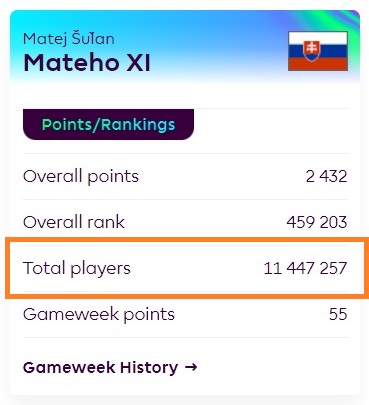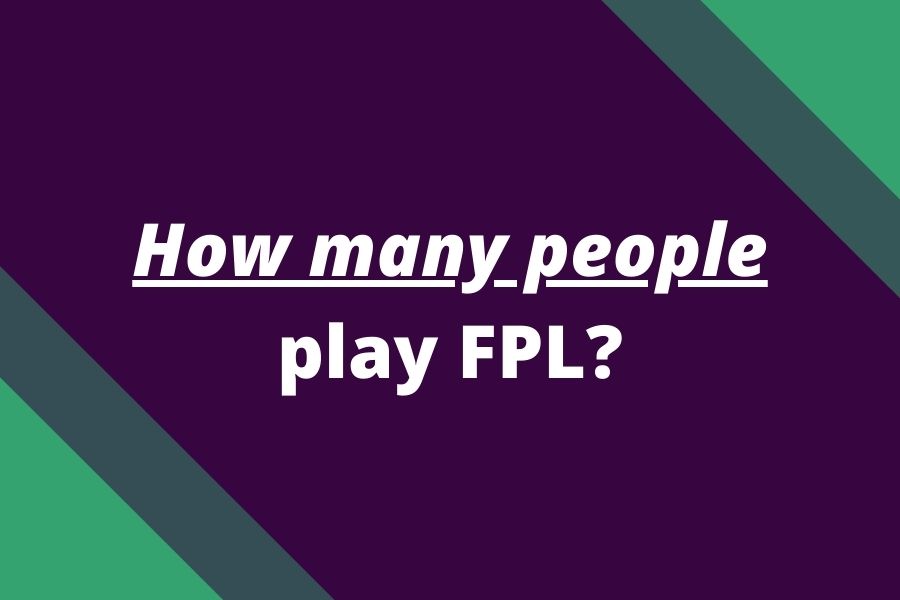In this article, we take a closer look at how many people play Fantasy Premier League.
With over 11 million players worldwide, FPL has grown from a niche pastime to a mainstream sensation. The game’s popularity has surged over the years, with more and more football fans joining the FPL community each season. This growth is not just confined to the UK, where the Premier League is based, but spans the globe, reflecting the international appeal of the Premier League itself.
The popularity of FPL is not an anomaly in the world of sports. Fantasy sports, in general, have seen a significant rise in recent years. However, FPL stands out even within this trend. Its user base is one of the largest among all fantasy sports, underscoring the unique appeal of football and the Premier League.
How many people play Fantasy Premier League?
The number of FPL players achieved its current peak at the end of the 2022/23 season, when 11 447 257 people played Fantasy Premier League.

This number is growing every year. For example, FPL finished the 2020/21 season with more than 8 million players and the 2021/22 season with more than 9 million participants.
Read more: Why is Fantasy Premier League so popular?
However, around half of all teams is usually inactive at the end of the season
It’s great, that around 10 million of people can participate at the beginning of the FPL season, however, not all participants remain active throughout the entire duration. A significant number of FPL managers become inactive as the season progresses.
For example, according to FPL Statistics, at the end of the 2019/20 season there were more than 60 % of inactive teams.
63.1% of all FPL teams are “inactive” (have not made a transfer in 5 or more gameweeks). #FPL
— FPL Statistics (@FPLStatistics) July 20, 2020
So even the number of registered teams at the end of each Fantasy Premier League season is extremely high, usually only around 35-40% of those managers play FPL even at the end of the season. The others just give up as the season progress.
This inactivity can be attributed to several factors:
- Lack of Immediate Success: FPL is a game of strategy and patience. However, some managers expect immediate success. When their teams do not perform well in the initial weeks, they may feel discouraged and lose interest, leading to inactivity.
- Time Commitment: FPL requires regular time investment. Managers need to keep up with player performances, injuries, transfers, and fixture schedules to make informed decisions about their teams. This time commitment can be challenging for some managers, especially those with busy schedules, leading them to become inactive.
- Loss of Interest in Football: Some FPL managers are casual football fans who join the game for fun or due to peer pressure. If their interest in football wanes during the season, they are likely to become inactive in FPL as well.
- Unforeseen Circumstances: Sometimes, personal circumstances or issues can lead to inactivity. Managers may have to deal with personal or professional commitments that leave them with little time for FPL.
Read more:
- 11 Reasons Why You Should Play Fantasy Football
- 12 Tips to Enjoy FPL Without Sacrificing Your Mental Health
The Impact of Fantasy Premier League
FPL’s impact extends beyond the digital realm. It has become one of the most important pillars of the Premier League, contributing significantly to fan engagement. FPL players follow the Premier League more closely, watch more games, and are more engaged with the league’s content. This increased engagement benefits the Premier League, enhancing its brand and contributing to its commercial success.
Moreover, FPL has changed how fans consume football. It has added another layer of interest to the Premier League, with fans not only supporting their favorite teams but also following their FPL players. This shift has made watching Premier League games a more engaging and immersive experience.

![3 Best Captain Picks for FPL GW33 [Captaincy Index] fpl best captain picks](https://www.fantasyfootballreports.com/wp-content/uploads/fpl-best-captain-picks.jpg)


